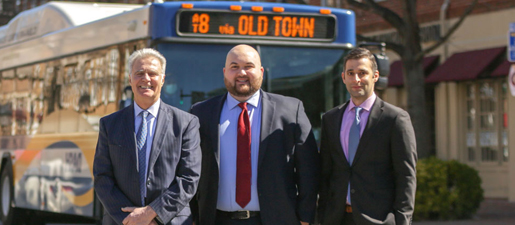
Dog bite and attack cases are very fact specific, and often hinge on two critical questions: Did the owner know of the dog’s dangerous tendencies? And where did the attack occur? Where the attack occurred can play a crucial role in these cases. While Virginia does not have a statewide leash law, most counties and cities in Northern Virginia have adopted local ordinances requiring dogs to be leashed in public. Below is a helpful reference guide to leash laws across Northern Virginia and Washington, D.C.—key information that may help you understand your rights if you have been injured and the duties of dog owners.
Local Leash Ordinances
- City of Alexandria: City Ordinance 5-7-35(a) states “Except as provided below, it shall be unlawful for the owner of any dog to permit the dog to be off the premises of its owner unless it is under the control of its owner or a responsible person capable of physically restraining the dog and kept secured by a leash…” Dogs must be leashed at all times when on public property. However, the operative word in this ordinance is “permit.” If the owner permitted their dog to be in public without a leash, then the owner could be liable for any harm caused by the dog.
- Arlington County: County Ordinance § 2-6 states: “All dogs shall be kept secured by a leash or lead, and under the control of the owner or other responsible person, or within the real property limits of its owners…” This ordinance does not require the owner to “permit” the dog to be off leash, which places a higher standard of care and duty on the owner of a dog that attacks someone on public property in Arlington County. This potentially places a higher standard of strict liability on the owner of any dog that attacks or bites someone in Arlington County.
- City of Fairfax: City Ordinance § 6-61(a) states: “It shall be unlawful for an owner to permit the running at large of any dog within the city…” Similar to the City of Alexandria, the owner must permit their dog to run at large to be in violation of this statute.
- Fairfax County: County Ordinance code § 41.1-2-4(a) states: “No dog shall run unrestricted, as defined in Section 41.1-1-1, in the County. Any person who is the owner of a dog found unrestricted in the County shall be in violation of this Section…” Fairfax County has a strict leash law; it does not require the owner of the dog to know the dog is running at large. This law is incredibly beneficial to use in cases where a person was attacked by a dog in a public space in Fairfax County.
- City of Falls Church: City Ordinance § 4-40(a) states: “All dogs shall be kept secured by a leash or lead, and under the immediate control of the owner or other responsible person, or shall be kept within the real property limits that are subject to the control of the dog’s owner or the person having responsibility of the dog…” Similar to Fairfax County, the City of Falls Church does not require the owner of the dog to have actual knowledge that their dog is running at large, the act of the dog running at large is enough to be in violation of this ordinance.
- Loudoun County: County Ordinance § 612.13 states: “No dog shall be off the property of its owner or custodian without being on a leash. The owner or custodian must have physical control of the dog while it is leashed. Any dog found to be off leash and not on the property of its owner or custodian will be considered running at large, and in violation of this section.” Similar to Fairfax County, this places a heightened duty on dog owners to make sure their dogs are on a leash or secured on their property. The owner does not need actual knowledge that their dog is loose to be in violation of this ordinance.
- Prince William County: County Ordinance § 4-23(a) states: “It shall be unlawful for the owner of any dog, except dogs used for hunting, to permit or allow such dog to run or be at large within the county…” Similar to the City of Alexandria, actual knowledge of the dog running at large is required to be in violation of this statute.
- Washington, D.C.: Municipal Regulation § 900.3 states: “No person owning, keeping, or having custody of a dog in the District shall permit the dog to be on any public space in the District, other than a dog park established by section 9a of the Animal Control Act of 1979, passed on 2nd reading on September 20, 2005 (Enrolled version of Bill 16-28), unless the dog is firmly secured by a substantial leash. The leash shall be held by a person capable of managing the dog.” This duty of care imposed on the owner of a dog is not as high as Fairfax, Loudoun, or Arlington County, as it requires the owner to “permit” their dog to run at large.
Why Leash Laws Matter in Personal Injury Cases
When a dog is not restrained and causes injury, it may be a strong indicator of negligence. Negligence is the legal foundation for recovering damages in most cases, and refers to a failure to exercise the level of care that a reasonable person would under similar circumstances. A leash law violation, for example, shows a breach of duty and makes it easier to prove fault. For example in one of our cases in Fairfax County, a 69-year-old woman was attacked by a dog that ran off its owner’s unfenced yard, thus violating Fairfax County’s leash laws. Leash laws play a role when it comes to negligence per se, which is a way of establishing negligence through violation of a law or ordinance. The Virginia Supreme Court, in Butler v. Frieden, 208 Va. 352 (1967), affirmed that when a defendant violated a city’s leash ordinance, a jury could find them liable for the harm caused by the dog for violating such an ordinance.
Does the Dog have a History?
If you can prove that the owner of a dog was aware of the animal’s violent tendencies and did not take extra precautions to prevent another incident, they can be held liable for any injuries the dog causes. Proof can be in the form of past records such as police reports or animal control documents, social media posts, or testimony from neighbors. Freedom of Information Act (FOIA) requests play a significant role in obtaining police or animal control reports to discover past attacks or complaints.
What if the Attack Happens on the Dog Owner’s Property?
Many people assume that if a dog bite occurs on the owner’s property, the owner is protected from liability. While property owners do have an expectation of privacy and control on their own land, they still have legal responsibility to prevent foreseeable harm to anyone that was invited or had a legal reason to be there (e.g., mail carrier, utility worker, social guests). If the dog is known to be aggressive towards food, other dogs, people, or has bitten someone is the past for example, then a future incident should have been foreseeable. One of our recent cases of a women reaching over a fence is a good example of liability even when a dog was on its own property.
Dog attacks don’t always take place outside on the sidewalk or in an open yard. We have seen many cases inside homes during thanksgiving dinners or sleepovers. The addition of food or an unfamiliar child can set a family dog off. If the incident is truly the animal’s first sign of aggression, then it may not be a viable case. We advise to always report a dog bite, which can be a difficult decision when dealing with close friends or family. However, in Virginia, most first offensives are simply documented, shot records are requested, and the animal is put on house arrest for a few weeks. So often bites are not recorded out of fear that the animal will be put down. But by recording the incident you are holding the owner more accountable, possibly preventing a future attack, and getting your medical care team the documents they need to ensure you are not at a higher risk for certain diseases or infections.
We Are Here to Help
While understanding local leash laws and negligence is a good starting point for evaluating a dog-related injury case, every situation is unique and fact-specific. If you or a loved one has been injured by a dog, don’t hesitate to reach out. Victims deserve answers, accountability, and support. Our team is here to help you take the next steps with compassion and clarity. We offer free consultations, call today.

